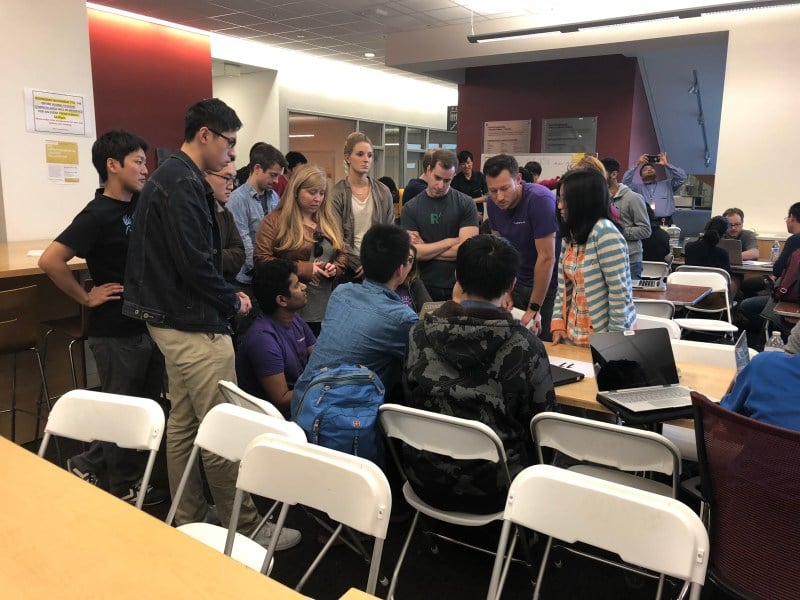On Saturday and Sunday, Huang Engineering basement buzzed with activity from participants in health++, the third annual health-focused hackathon organized by Stanford Health Innovations in Future Technologies (SHIFT), an organization that aims to empower students to improve healthcare by promoting and cultivating health innovation.
A total of 19 teams, including individuals from academia and industry at various levels, worked together on affordable health care solutions in specific sectors of the health industry, such as dental care, dermatology, pathology and neurology. The event drew more than 200 attendees in total and was attended by students, professionals, mentors, expert judges and industry sponsors, according to health++ co-director Christine Liu ’21.
Ankit Baghel ’19, co-director of health++ and co-president of SHIFT, said that the hackathon was an effective way to bridge the gap between individuals who worked in the healthcare industry and students with a desire to spur change through their own ideas and projects.
“In healthcare innovation you have, let’s say, two key players,” Baghel said. “You have the doctors and the patients who need these advances in technology and the people who develop [them], and I think there isn’t always enough communication between those two.”
Baghel added that the point of health++ is to bring those two key players together at the beginning to make sure they understand each other’s circumstances during brainstorming.
Julianne Bautista, Innovation Ventures Associate at the University of California San Francisco, said she appreciated the interdisciplinary nature of the hackathon. Bautista was a member of finalist team HTraxx+, which implemented a system using electronic health record data to pinpoint specific locations that are at a high risk for hospital-acquired infections.
“My favorite part about this hackathon was seeing how much progress you can make when different disciplines come together and put together a project,” Bautista said. “Often, we’re just surrounded by people who are like us and maybe in the same industry, but when you put different minds together you can really produce something incredible.”
The hackathon opened with a six-member speaker panel featuring industry professionals, followed by a keynote address by Paul Tang, Vice President and Chief Health Transformation Officer at IBM Watson Health. The speakers called for attendees to ensure that the projects on which they worked were driven by a true need in the health space.
“This was really valuable because a lot of people are clearly interested in health tech, but it’s really important to make sure that they’re driving this talent toward something that’s really innovating it in a positive and useful way,” said health++ co-director Grace Kim ’21.
Participants were given the opportunity to pitch problems in the health space in an open-floor setup before team formation began. Teams then worked on their projects, with guidance from mentors, over a 24-hour period.
For psychiatrist and Youper CEO Jose Hamilton Vargas, working as a mentor at health++ was an opportunity to help upcoming generations feel inspired about their ability to create solutions for medicine and health. Youper is a mental health assistant powered by artificial intelligence.
“We have a lot of great people here, great students with this energy, excited about solving problems,” Vargas said. “Sometimes it’s good to be naive, and think, ‘This problem is huge, but I can do it.’ I think [this] hackathon is about that.”
At the conclusion of the project development period, teams were allotted five minutes to pitch their solutions to judges in a project expo. The top eight teams presented their solutions to event attendees in the William R. Hewlett Teaching Center.
Prizes included products and cash awards from sponsors Intel, NeoDesign, Stanford BioDesign and athenahealth+Redox, as well as grand cash prizes for the top three participants.
Kenneth Nturibi ’20, Martin Mbuthia ’20 and Peter Wang ’20 were part of an all- Stanford team that reached the final eight. Their project, Hakika, uses blockchain technology to reduce the likelihood of corruption in the pharmaceutical supply chains of developing countries by tracking the movement of drugs from production to consumption.
According to the team members, health++ encouraged participants to think of all aspects of their solution, rather than just the technical component.
“This is my first time doing health++,” Nturibi said. “You also need to know your business model. It encourages you as a developer not just to think about the product, but also how economically viable the product is.”
Contact Ruth-Ann at ruthanna ‘at’ stanford.edu.
